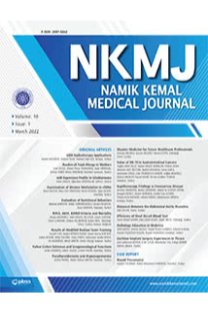Mesna-doxorubisin-ifosfamid-dakarbazin (MAID) ile tedavi edilen Yumuşak doku sarkom hastalarımızın uzun dönem takip sonuçları: Tek merkez deneyimi
Yumuşak doku sarkomu, prognostik faktörler, , doxorubisin
Long-term Outcome of Soft Tissue Sarcomas Treated with Mesna-Doxorubicin-Ifosfamid-Dacarbazine regimen (MAID): A Retrospective Study from a Single Institution
Soft tissue sarcoma, prognosis, , doxorubicine,
___
- 1. Siegel RL, Miller KD, Jemal A. Cancer statistics, 2018. CA Cancer J Clin. 2018;68(1):7-30
- 2. Ducimetière F, Lurkin A, Ranchère-Vince D, Decouvelaere AV, Péoc'h M, Istier L, et al. Incidence of sarcoma histotypes and molecular subtypes in a prospective epidemiological study with central pathology review and molecular testing. PloS one. 2011;6(8):e20294.
- 3. Borden EC, Baker LH, Bell RS, Bramwell V, Demetri GD, Eisenberg BL, et al. Soft tissue sarcomas of adults: state of the translational science. Clin Cancer Res. 2003;9(6): 1941-1956.
- 4. Colombo C, Randall RL, Andtbacka RHI, Gronchi A. Surgery in soft tissue sarcoma: more conservative in extremities, more extended in the retroperitoneum. Expert Rev Anticancer Ther. 2012;12(8):1079–1087.
- 5. Crago AM, Brennan MF. Principles in management of soft tissue sarcoma. Adv Surg. 2015;49:107–122
- 6. Koliou P, Karavasilis V, Theochari M, Pollack SM, Jones RL, Thway K. Advances in the treatment of soft tissue sarcoma: Focus on eribulin. Cancer Manag Res. 2018;10:207-216
- 7. Jain A, Sajeevan KV, Babu KG, Lakshmaiah KC. Chemotherapy in adult soft tissue sarcoma. Indian J Cancer. 2009;46(4):274-87
- 8. Ratan R, Patel SR. Chemotherapy for soft tissue sarcoma. Cancer. 2016;122(19), 2952-2960.
- 9. Schöffski P, Cornillie J, Wozniak A, Li H, Hompes D. Soft tissue sarcoma: an update on systemic treatment options for patients with advanced disease. Oncol Res Treat. 2014;37(6): 355-362.
- 10. Gortzak E, Azzarelli A, Buesa J, Bramwell VHC, Van Coevorden F, Van Geel AN, et al. A randomised phase II study on neo-adjuvant chemotherapy for ‘high-risk’adult soft-tissue sarcoma. Eur J Cancer, 2001:37(9):1096-1103.
- 11. DeLaney TF, Spiro IJ, Suit HD, Gebhardt MC, Hornicek FJ, Mankin HJ, et al. Neoadjuvant chemotherapy and radiotherapy for large extremity soft-tissue sarcomas. Int J Radiat Oncol Biol Phys. 2003;56(4):1117-1127.
- 12. Sarcoma Meta-analysis Collaboration. (1997). Adjuvant chemotherapy for localised resectable soft-tissue sarcoma of adults: meta-analysis of individual data. Lancet. 1997;350(9092): 1647-1654.
- 13. Han K, Sun Y, Zhang J, Tang L, Wang Z, Zhao H, et al. Retrospective clinical analysis of MAID protocol as first-line treatment on 137 metastatic soft-tissue sarcomas patients. The Chinese-German Journal of Clinical Oncology. 2012;11(2):117-120.
- 14. Antman K, Crowley J, Balcerzak SP, Rivkin SE, Weiss GR, Elias A, et al. An intergroup phase III randomized study of doxorubicin and dacarbazine with or without ifosfamide and mesna in advanced soft tissue and bone sarcomas. J Clin Oncol 1993;11:1276-1285
- 15. Marshall S, Nakano K, Sugiura Y, Taira S, Ono M, Tomomatsu J, et al. Outcome for Advanced or Metastatic Soft Tissue Sarcoma of Nonextremities Treated with Doxorubicin-Based Chemotherapy: A Retrospective Study from a Single Cancer Institution. Sarcoma. 2018;8926598
- 16. Noone AM, Howlader N, Krapcho M, Miller D, Brest A, Yu M, et al. SEER Cancer Statistics Review, 1975-2015, National Cancer Institute. Bethesda, MD, https://seer.cancer.gov/csr/1975_2015/, based on November 2017 SEER data submission, posted to the SEER web site, April 2018.
- 17. Hoang NT, Acevedo LA, Mann MJ, Tolani B. A review of soft-tissue sarcomas: translation of biological advances into treatment measures. Cancer Manag Res. 2018;10:1089-1114.
- 18. El-Jabbour JN, Akhtar SS, Kerr GR, McLaren KM, Smyth JF, Rodger A, et al. Prognostic factors for survival in soft tissue sarcoma. Br J Cancer. 1990;62(5):857-861.
- 19. Vraa S, Keller J, Nielsen OS, Sneppen O, Jurik AG, Jensen OM. Prognostic factors in soft tissue sarcomas: the Aarhus experience Eur J Cancer. 1998;34(12): 1876-1882
- ISSN: 2587-0262
- Yayın Aralığı: 4
- Başlangıç: 2013
- Yayıncı: Galenos Yayınevi
The School Milk Project Conducted in Primary Schools and Parents' Views on the Issue
Sinan TÜFEKCİ, Bilge SERTEL TÜFEKCİ, Birol TOPÇU
Prostat kanseri moleküler mekanizmasında kodlanmayan RNA’ların rolü
Cem MİRİLİ, Semra PAYDAS, Mahmut BUYUKSİMSEK, Mert TOHUMCUOGLU, Abdullah EVREN YETİSİR, Ali OGUL
Mengühan ARAZ ALTAY, İşık GÖRKER
Böbrek Biyopsilerinde Akut İnterstisyel Nefrit Oranlarının Değerlendirildiği Tek Merkez Çalışması
Ayhan ŞAHİN, İlker YILDIRIM, Onur BARAN, Mustafa GÜNKAYA, Cavidan ARAR, Ercan GÜNERİ
GLUTAMAT İLE İNDÜKLENEN NÖRON HASARINDA FLORETİN VE FLORİZİN’İN ETKİLERİ: İN VİTRO ÇALIŞMA
Damla BİNNETOĞLU, Muhammed YAYLA, Tuğba Nurcan YÜKSEL
İrritabl Barsak Sendromu ve Laktoz İntoleransı İlişkisi
Mustafa Reşat DABAK, Tuğba ARSLAN KÜÇÜK, Sabah TÜZÜN, Hüseyin ÇETİN, Emel AHISHALI, Can DOLAPÇIOĞLU
